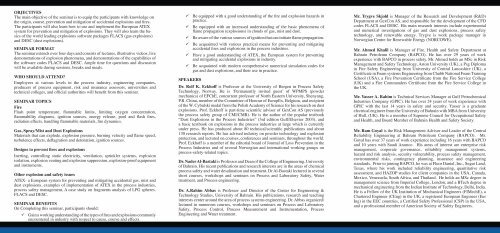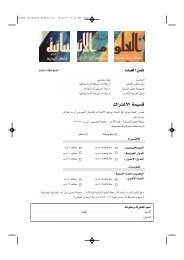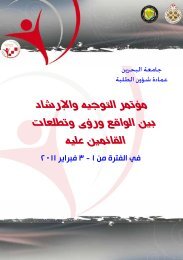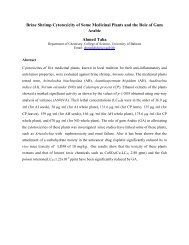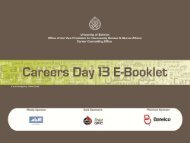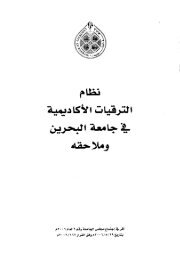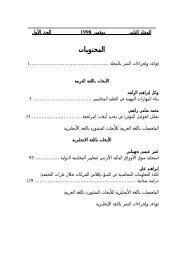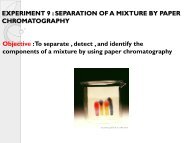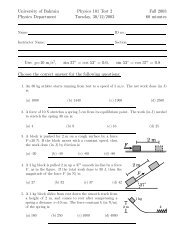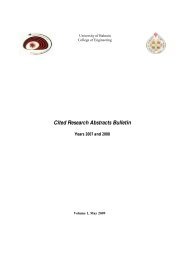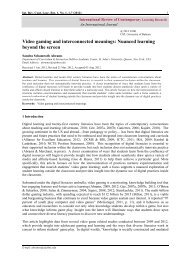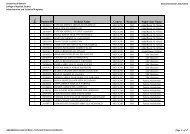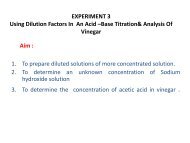Department
Department
Department
You also want an ePaper? Increase the reach of your titles
YUMPU automatically turns print PDFs into web optimized ePapers that Google loves.
OBJECTIVES<br />
The main objective of the seminar is to equip the participants with knowledge on<br />
the origin, course, prevention and mitigation of accidental explosions and fires.<br />
The participants will also learn how to use and implement the European ATEX<br />
system for prevention and mitigation of explosions. They will also learn the basics<br />
of the world leading explosions software packages FLACS (gas explosions)<br />
and DESC (dust explosions).<br />
SEMINAR FORMAT<br />
The seminar extends over four days and consists of lectures, illustrative videos, live<br />
demonstrations of explosion phenomena, and demonstrations of the capabilities of<br />
the software codes FLACS and DESC. Ample time for questions and discussion<br />
will be available during sessions, breaks and meals.<br />
WHO SHOULD ATTEND?<br />
Employees at various levels in the process industry, engineering companies,<br />
producers of process equipment, risk and insurance assessors, universities and<br />
technical colleges, and official authorities will benefit from this seminar.<br />
SEMINAR TOPICS<br />
Fire<br />
Flash point temperature, flammable limits, limiting oxygen concentration,<br />
flammability diagrams, ignition sources, energy release, pool and flash fires,<br />
radiation effects, handling flammable materials, fire dynamics.<br />
Gas, Spray/Mist and Dust Explosions<br />
Materials that can explode, explosion pressure, burning velocity and flame speed,<br />
turbulence effects, deflagration and detonation, ignition sources.<br />
Designs to prevent fires and explosions<br />
Inerting, controlling static electricity, ventilation, sprinkler systems, explosion<br />
isolation, explosion venting and explosion suppression, explosion-proof equipment<br />
and instruments.<br />
Other explosion and safety issues<br />
ATEX- a European system for preventing and mitigating accidental gas, mist and<br />
dust explosions, examples of implementation of ATEX in the process industries,<br />
process safety management, A case study on fragments analysis of LPG spheres.<br />
FLACS and DESC.<br />
SEMINAR BENEFITS<br />
On Completing this seminar, participants should:<br />
Gain a working understanding of the types of fires and explosions commonly<br />
encountered in industry with respect to cause, course and effects.<br />
Be equipped with a good understanding of the fire and explosion hazards in<br />
practice.<br />
Be equipped with an increased understanding of the basic phenomena of<br />
flame propagation (explosions) in clouds of gas, mist and dust.<br />
Be aware of the various sources of ignition that can initiate flame propagation.<br />
Be acquainted with various practical means for preventing and mitigating<br />
accidental fires and explosions in the process industries.<br />
Have a good understanding of ATEX, the European system for preventing<br />
and mitigating accidental explosions in industry.<br />
Be acquainted with modern comprehensive numerical simulation codes for<br />
gas and dust explosions, and their use in practice.<br />
SPEAKERS<br />
Dr. Rolf K. Eckhoff is Professor at the University of Bergen in Process Safety<br />
Technology, Norway. He is ‘Permanently invited guest’ of WPMPS (powder<br />
mechanics) of EFChE, concurrent professor of North Eastern University, Shenyang,<br />
P.R. China, member of the Committee of Honour of EuropEx, Belgium, and recipient<br />
of the W. Cybulski medal from the Polish Academy of Science for his research on dust<br />
explosions. Prof. Eckhoff is part-time scientific adviser of GexCon AS (previously<br />
the process safety group of CMI/CMR). He is the author of the popular textbook<br />
“Dust Explosions in the Process Industries” (3rd edition Gulf/Elsevier 2003), and<br />
a basic textbook on explosions in the process industries at large which is currently<br />
under press. He has produced about 80 technical/scientific publications and about<br />
130 research reports. He has advised industry on powder technology and explosion<br />
protection, and lectured on courses, conferences and seminars, throughout the world.<br />
Prof. Eckhoff is a member of the editorial board of Journal of Loss Prevention in the<br />
Process Industries and of several Norwegian and international working groups on<br />
process-safety-related topics.<br />
Dr. Nader Al-Bastaki is Professor and Dean of the College of Engineering, University<br />
of Bahrain. His recent publications and research interests are in the areas of chemical<br />
process safety and water desalination and treatment. Dr Al-Bastaki lectured in several<br />
short courses, workshops and seminars on Process and Laboratory Safety, Water<br />
treatment, and Process engineering.<br />
Dr. A.Rahim Abbas is Professor and Director of the Center for Engineering &<br />
Technology Studies, University of Bahrain. His publications, research and teaching<br />
interests center around the area of process systems engineering. Dr. Abbas organized/<br />
lectured in numerous courses, workshops and seminars on Process and Laboratory<br />
Safety, Process Control, Process Measurement and Instrumentation, Process<br />
Engineering and Water treatment.<br />
Mr. Trygve Skjold is Manager of the Research and Development (R&D)<br />
<strong>Department</strong> at GexCon AS, and responsible for the development of the CFD<br />
codes FLACS and DESC. His main research interests include experimental<br />
and numerical investigations of gas and dust explosions, process safety<br />
technology, and renewable energy. Trygve is work package manager in<br />
Norwegian Centre for Renewable Energy (NORCOWE).<br />
Mr. Ahmed Khalil is Manager of Fire, Health and Safety <strong>Department</strong> at<br />
Bahrain Petroleum Company (BAPCO). He has over 29 years of work<br />
experience with BAPCO in process safety. Mr. Ahmed holds an MSc in Risk<br />
Management and Safety Technology, Aston University (UK), a Psg Diploma<br />
in Fire Safety Engineering from University of Central Lancashire (UK), a<br />
Certificate in Foam systems Engineering from Chubb National Foam Training<br />
School (USA), a Fire Prevention Certificate from the Fire Service College<br />
(UK) and a Fire Commanders Certificate from the Fire Service College in<br />
the UK.<br />
Mr. Yasser A. Rahim is Technical Services Manager at Gulf Petrochemical<br />
Industries Company (GPIC). He has over 24 years of work experience with<br />
GPIC with the last 14 years in safety and security. Yasser is a graduate<br />
electrical engineer from the University of Bahrain with MBA from University<br />
of Hull, (UK). He is a member of Supreme Council for Occupational Safety<br />
and Health, and Board Member of Bahrain Health and Safety Society.<br />
Mr. Ram Goyal is the Risk Management Advisor and Leader of the Central<br />
Reliability Engineering at Bahrain Petroleum Company (BAPCO). Mr.<br />
Goyal has over 37 years of work experience including 16 years with BAPCO<br />
and 10 years with Saudi Aramco. His areas of interest are enterprise risk<br />
management, corporate governance, reliability management systems,<br />
hazard and risk analysis, security vulnerability, process safety management,<br />
environmental risks, contingency planning, insurance and engineering<br />
standards. Prior to joining BAPCO, he was at Fluor Daniel, Inc., Sugar Land,<br />
Texas, where his work included reliability engineering, quantitative risk<br />
assessment, and HAZOP studies for client companies in the USA, Canada,<br />
Mexico, Venezuela, South Africa, and Thailand. He holds an MSc degree in<br />
management science from Imperial College, London, and a BTech degree in<br />
mechanical engineering from the Indian Institute of Technology, Delhi, India.<br />
He is a Fellow of the UK Institution of Mechanical Engineers (FIMechE), a<br />
Chartered Engineer (CEng) in the UK, a registered European Engineer (Eur<br />
Ing) in the EEC countries, a Certified Safety Professional (CSP) in the USA,<br />
and a professional member of American Society of Safety Engineers.


